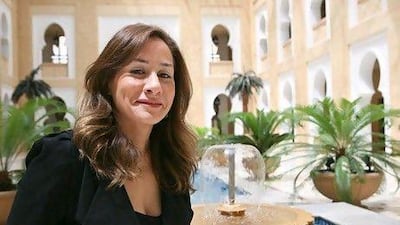Visa, the global payments technology company, has set itself an admirable goal: to teach 20 million people worldwide about smart money management by next May. Lama Kabbani, the corporate communications manager at Visa Middle East, says the company's inaugural Financial Literacy Barometer, which measures the level of financial literacy in 28 countries, has placed the UAE 15th overall - and first in the Middle East and North Africa (Mena).
Is Visa's campaign working?
I think it is. It shows that the UAE has some kind of awareness right there between all those countries. But it's still an ongoing process. We've just started, to be honest, and people are warming up to the idea. But there's still a lot of work to be done.
What helped the UAE to become the first-ranked country in the Mena region for financial literacy?
One of the big reasons was the financial crisis. A lot of people were in debt and there's become more awareness about people getting into trouble, so the communities, institutions saw there was a problem. From our side, we are creating all these tools, all the websites, our Financial Football game and engaging with people in the different communities, such as schools, parental think tanks, the Marvel comics. So by creating that awareness, I'd like to think that Visa has had some kind of influence with this.
Is it never too late to learn financial literacy?
It's never too late. I can tell you my example. Before I came on board at Visa and started working on the [financial literacy] programme, I had my little gaps. I used my credit card irresponsibly. You can always start working on your finances, but most important is to have a plan, to have a budget sheet. Anybody can start from somewhere. It is easier to start earlier than later because if you start earlier, you can create a habit and you know what a sound decision is. You become a money manager.
Should financial literacy become mandatory in all school curriculums?
Definitely - and this is what we've been pushing for. We did a survey two years ago and 95 per cent of the teachers agreed that it should be mandatory. But the problem is they are swamped by their own curriculums. There's a bit of a dilemma on what to do with this curriculum. Visa has a great [financial literacy] curriculum; it is ready and it's for teenagers and above. I think it is just a matter of convincing the teachers and the head of the curriculum departments where to fit it and how much time they need. It could be a part of social science, it could be part of maths. It's really a decision that the school needs to make.
Why do you think there has been a lack of knowledge about financial literacy in the UAE?
I think it is a combination of culture. I am an Arab and I come from that culture where we don't really talk about money. It's not something that is brought up in the household. I hear there is a difference between Arabs and expats, western Europeans, where it is OK to talk about money; what mummy and daddy make, this is what they spend on. In our culture, it isn't. And it's not in our culture to show that you need money or that you talk about money. The other part of it is that in this part of the world, we are all quite comfortable, quite well off and there's no need really to look at our finances until it comes to a point where you are on your own, you've overspent, you are in debt, you're paying the minimum on your credit card. And then a light bulb goes off in your brain and you say you are in a bit of trouble.


